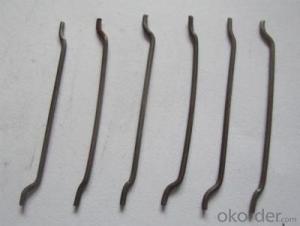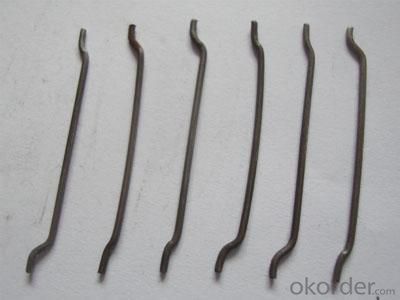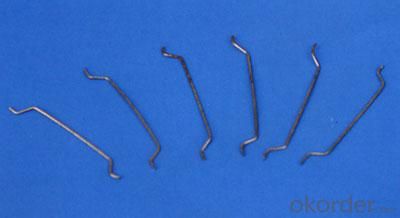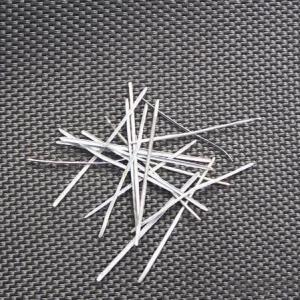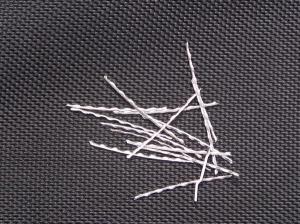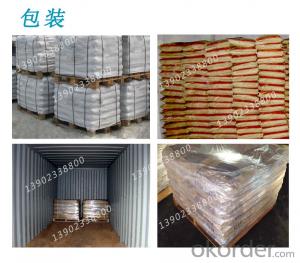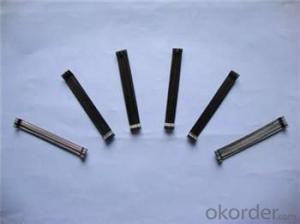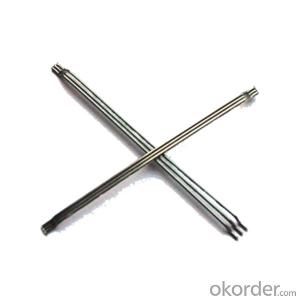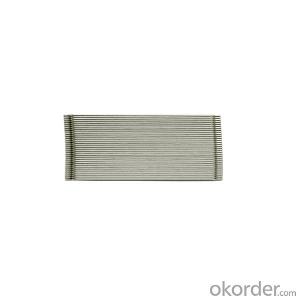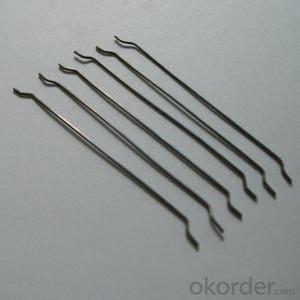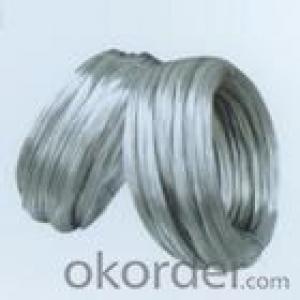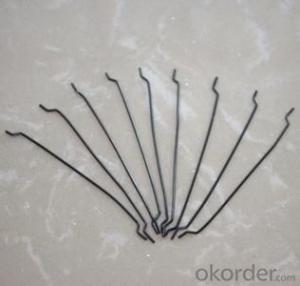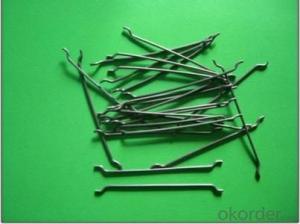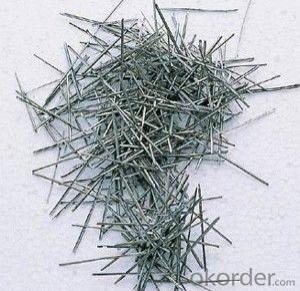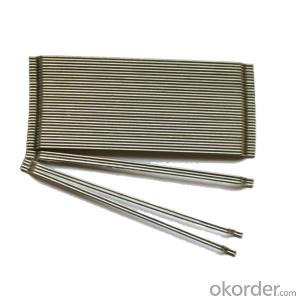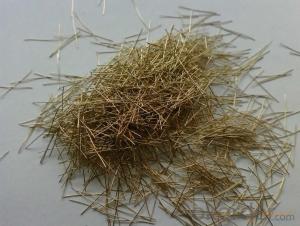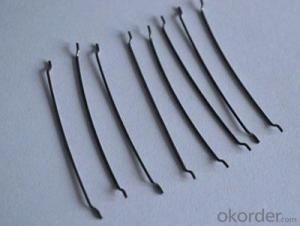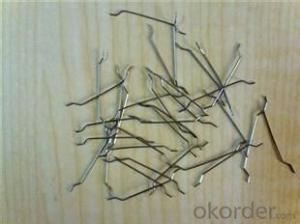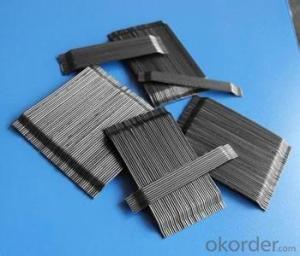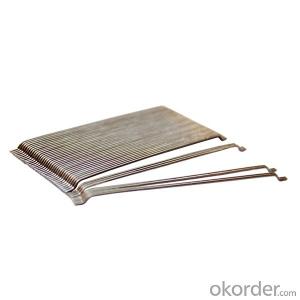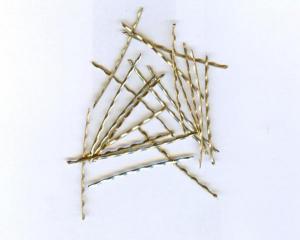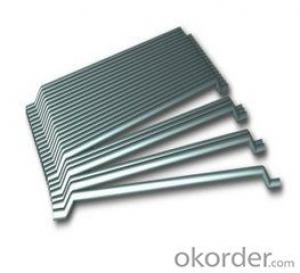Melt Extract Stainless Steel Fiber Concrete Steel Fiber Low Carbon CNBM Company
- Loading Port:
- Tianjin
- Payment Terms:
- TT OR LC
- Min Order Qty:
- 2000 kg
- Supply Capability:
- 250000 kg/month
OKorder Service Pledge
OKorder Financial Service
You Might Also Like
Quick Details
Place of Origin: China (Mainland)
Material: Steel
material: steel wire
application: for concrete reinforcement
appearance: clean and bright
shape: steel fiber
Product features
concrete steel fiber is specifically to enhance concrete in its hardened state ,the uniform distribution of steel fiber throughout the concrete greatly improve concrete bonding and tensile strength ,additionally it provides exceptional load stability and durability ,as reliable and efficient concrete reinforcement material
it is widely ued in buildings ,bridges ,thin roo engineering ,highway etc.
Specifications
length :20-60mm
diameter :0.5MM-1.2MM
tensile strengh:>1100Mpa
| diameter | length | tensile strength | |
| 0.5mm | 35mm | 1100Mpa | |
| 0.75 | 60mm | 1100Mpa | |
| 0.9 | 60m | 1100Mpa |
others can do according to your requirement
Picture
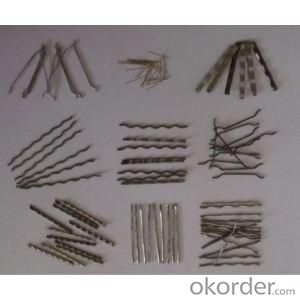
steel fiber for concrete
FAQ
we can produce any type steel fiber and of course we can make production according to your requirement
we have specilize in this field for almost 10 years ,with good quality and competitive price
- Q: Can melt extract stainless steel fiber be used in sports field pavements?
- Yes, melt extract stainless steel fiber can be used in sports field pavements. Stainless steel fibers are known for their high strength and durability, making them an excellent choice for applications that require resistance to wear and heavy traffic, such as sports field pavements. These fibers can improve the overall performance and lifespan of the pavement by enhancing its toughness, crack resistance, and fatigue resistance. Additionally, the corrosion resistance of stainless steel ensures that the fibers will not deteriorate over time, even in harsh weather conditions. Overall, using melt extract stainless steel fiber in sports field pavements can help create a more robust and long-lasting surface that can withstand the rigorous demands of sports activities.
- Q: What is the effect of melt extract stainless steel fiber on the modulus of rupture of shotcrete?
- The modulus of rupture can be significantly affected by the addition of melt extract stainless steel fiber in shotcrete. This term refers to the maximum stress a material can endure before failing in a bending or tensile test. By incorporating stainless steel fibers into shotcrete, its tensile strength and flexural performance are improved, thereby enhancing the modulus of rupture. These fibers act as reinforcement within the shotcrete matrix, improving its overall mechanical properties. The distribution of stresses within the shotcrete is more uniform thanks to the presence of stainless steel fibers, which helps prevent the formation and spread of cracks. Consequently, the modulus of rupture is higher, allowing the shotcrete to withstand greater bending and tensile forces without failure. Moreover, the inclusion of stainless steel fibers also enhances the ductility of shotcrete. Ductility refers to a material's ability to deform plastically before ultimate failure. The fibers create a bridge-like effect, enabling the shotcrete to deform and absorb energy before reaching its breaking point. This increased ductility further contributes to the improvement in the modulus of rupture. In conclusion, the addition of melt extract stainless steel fiber in shotcrete positively impacts the modulus of rupture. It enhances the material's tensile strength, flexural performance, and ductility, resulting in a higher resistance to bending and tensile forces. Consequently, shotcrete with stainless steel fibers becomes a highly durable and reliable construction material, particularly suitable for applications requiring high strength and structural integrity.
- Q: What is the effect of melt extract stainless steel fiber on the fatigue resistance of concrete?
- The addition of melt extract stainless steel fiber to concrete can significantly enhance its fatigue resistance. Stainless steel fibers are known for their high tensile strength and durability, making them ideal for improving the performance of concrete in fatigue-prone applications. The primary effect of melt extract stainless steel fiber on the fatigue resistance of concrete is the reinforcement it provides. These fibers act as a distributed network within the concrete matrix, effectively bridging cracks that may occur under cyclic loading. By preventing crack propagation and reducing crack width, the presence of stainless steel fibers improves the overall fatigue strength of the concrete. Additionally, the high ductility and corrosion resistance of stainless steel fibers contribute to the enhanced fatigue resistance of concrete. The fibers are capable of absorbing and redistributing stress energy, thereby reducing the concentration of stress at localized areas. This ability to dissipate energy helps in preventing the initiation and growth of cracks, ultimately improving the fatigue performance of the concrete. Furthermore, the addition of melt extract stainless steel fiber can also improve the overall toughness and durability of concrete. The fibers increase the resistance to impact and dynamic loading, making the concrete more resistant to fatigue failure. This is particularly beneficial in structures subjected to repetitive loading, such as bridges, pavements, and industrial floors. In summary, the incorporation of melt extract stainless steel fiber in concrete significantly enhances its fatigue resistance. The reinforcement provided by these fibers, along with their high ductility and corrosion resistance, improves crack bridging, reduces crack width, and enhances the overall toughness of the concrete. As a result, structures reinforced with stainless steel fibers exhibit improved durability and extended service life, making them ideal for fatigue-prone applications.
- Q: Is melt extract stainless steel fiber compatible with different types of shotcrete accelerators?
- Different types of shotcrete accelerators can be used with melt extract stainless steel fiber, as they are compatible. Shotcrete accelerators are employed to quicken the setting and hardening processes of shotcrete or concrete. To enhance the mechanical properties and durability of the final product, melt extract stainless steel fibers are frequently incorporated into shotcrete mixes. These fibers, made from stainless steel, possess exceptional corrosion resistance, allowing them to be compatible with various shotcrete accelerators. The inclusion of melt extract stainless steel fibers can bolster the bond strength, crack resistance, and impact resistance of shotcrete, regardless of the accelerator type. Thus, it is safe to assert that melt extract stainless steel fiber is compatible with different types of shotcrete accelerators.
- Q: Can melt extract stainless steel fiber be used in railway concrete sleepers?
- Yes, melt extract stainless steel fiber can be used in railway concrete sleepers. It is a durable and corrosion-resistant material that enhances the strength and longevity of the sleepers, making them suitable for heavy train loads and harsh weather conditions.
- Q: Can melt extract stainless steel fiber be used in architectural concrete applications?
- Yes, melt extract stainless steel fiber can be used in architectural concrete applications.
- Q: Can melt extract stainless steel fiber be easily dispersed in concrete mixtures?
- Yes, melt extract stainless steel fiber can be easily dispersed in concrete mixtures. The fine and uniform nature of these fibers allows for easier mixing and distribution within the concrete matrix. Additionally, the high aspect ratio of the fibers enhances their ability to interlock with the concrete, thereby improving its mechanical properties such as tensile strength and crack resistance. The integration of melt extract stainless steel fibers in concrete mixtures can effectively enhance the overall performance and durability of the concrete.
- Q: How does melt extract stainless steel fiber improve the fire resistance of concrete?
- The fire resistance of concrete is improved by the presence of melt extract stainless steel fiber, which serves as a reinforcement material. When exposed to high temperatures during a fire, the stainless steel fiber reinforces the concrete, enhancing its structural integrity by providing extra strength and stability. The stainless steel fiber is capable of withstanding high temperatures without melting or losing its mechanical properties. As a result, it effectively distributes stress and load within the concrete, preventing cracks and fractures that could compromise the material's structural integrity. Moreover, the stainless steel fiber in the concrete helps delay the occurrence of spalling. Spalling is when the surface layers of concrete break apart and detach due to the rapid expansion of trapped moisture within the material when exposed to high temperatures. By reinforcing the concrete, the stainless steel fiber retains moisture and hinders its rapid release, thereby reducing the risk of spalling. Additionally, the stainless steel fiber acts as a heat sink, absorbing and dissipating heat more efficiently than the surrounding concrete. This capability aids in reducing the overall temperature increase of the material during a fire. By diminishing the temperature rise, the stainless steel fiber can minimize thermal expansion and contraction, decreasing the chances of cracks and preserving the concrete's structural integrity. In conclusion, incorporating melt extract stainless steel fiber into concrete greatly enhances its fire resistance by bolstering its structural strength, reducing spalling, and minimizing temperature rise. This makes it a highly effective solution for enhancing the fire safety of concrete structures in various applications, such as buildings, tunnels, and industrial facilities.
- Q: Can melt extract stainless steel fiber be used in architectural precast cladding?
- Certainly, architectural precast cladding can make use of melt extract stainless steel fiber. Due to their exceptional strength, durability, and resistance to corrosion, stainless steel fibers are widely employed in architectural applications. These fibers can greatly enhance the tensile and flexural strength of precast cladding, minimize cracking, and bolster its resistance to impact and abrasion. Moreover, stainless steel fibers provide design flexibility and can be seamlessly integrated into the concrete mixture without compromising its workability. As a result, the incorporation of melt extract stainless steel fiber in architectural precast cladding can significantly enhance the lifespan and functionality of the cladding system.
- Q: Does melt extract stainless steel fiber improve the resistance to sulfate attack of shotcrete?
- Yes, melt extract stainless steel fiber does improve the resistance to sulfate attack of shotcrete.
Send your message to us
Melt Extract Stainless Steel Fiber Concrete Steel Fiber Low Carbon CNBM Company
- Loading Port:
- Tianjin
- Payment Terms:
- TT OR LC
- Min Order Qty:
- 2000 kg
- Supply Capability:
- 250000 kg/month
OKorder Service Pledge
OKorder Financial Service
Similar products
Hot products
Hot Searches
Related keywords
